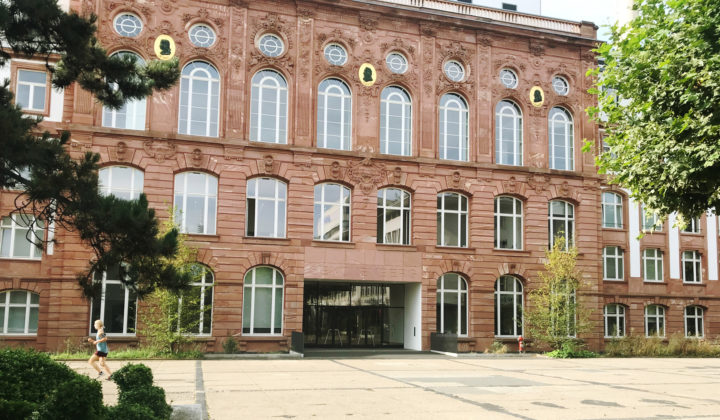Senckenberg Distinguished Lecture Series
Emerging Frontiers in Nature Research
The Distinguished Lecture Series brings internationally renowned scholars and other intellectual and civic leaders to Senckenberg. In addition to the featured lecture, each visit typically includes discussions or a public event designed to engage a wide range of Senckenberg scientists.
Program
We are thrilled to announce the first lecture in the new “Senckenberg Distinguished Lecture Series.” Throughout the year, outstanding scientists from the international community who agreed to participate in the Lecture Series will present talks on the overarching theme of “Emerging Frontiers in Nature Research.”
With this lecture series we aim to create a new, primarily internationally oriented platform for networking and exchange, for creating synergies and inspired discussions – in short: a further component to add to our lively scientific and curiosity-driven in-house culture.
Lecture #5
Effects of multiple global change drivers on soils and terrestrial ecosystems
The vast majority of experimental work exploring the effects of drivers of global change on terrestrial ecosystems applies only one or two factors (actually about 98 % of the published literature). This means we are almost completely blind to the concurrent effects of many jointly acting factors, even though this is arguably the reality. Experimenting with such a large number of factors comes with many challenges. I report on our work using a design that emphasizes the number of factors: this alone can explain many effects, highlighting the fact that reducing the dimensionality of the global change problem could be one pathway towards greater ecosystem health.
About the lecturer
Matthias Rillig is a professor of ecology at the Freie Universität Berlin and director of the Berlin-Brandenburg Institute of Advanced Biodiversity Research. His group works on global change effects on soils (including microplastics), with an organismal focus on fungi.
Lecture #4
A Safe and Just Future for Humanity and Earth
After 11,000 years of remarkably stable climate that created conditions conducive to the evolution of civilizations, humanity is confronted with multiple global crises. This talk gives a scientific update of the risks of destabilizing the planet, providing evidence that six of nine Planetary Boundaries are already transgressed today, and in turn offering a new definition of sustainability. The increasing frequency and amplitude of extreme events is just one consequence of overshooting the 1.5°C global warming limit – a real biophysical limit, not just a political target – beyond which multiple tipping points in the Earth system are not only likely to be triggered, but run the risk of setting off tipping cascades.
About the lecturer
Johan Rockström is Director of the Potsdam Institute for Climate Impact Research and Professor of Earth System Science at the University of Potsdam.
Lecture #3
From Climate Change to Biodiversity and back
While the climate crisis is perceptible for everyone and ubiquitous in public discourse, the biodiversity crisis on our planet is occurring quietly and often goes unnoticed. How is biodiversity changing globally and at home? How does this affect the integrity and functioning of our ecosystems and eventually us humans? Drawing from experiments and observations worldwide and in Germany, Christian Wirth explains how the two crises are linked. He argues that biodiversity is not only a victim of climate change but also a remedy for it; conserving and creating biodiverse landscapes is key to effective climate protection.
About the lecturer
Christian Wirth is a German plant ecologist who is interested in the many ways plants and their diversity shape the functioning of ecosystems. Based at Leipzig University, he is speaker of the DFGfunded German Centre for Integrative Biodiversity Research (iDiv) Halle Jena Leipzig and director of the Botanical Garden. Besides being a Max Planck Fellow for ten years, he cofounded the global TRY database of plant traits, runs the Leipzig Canopy Crane, and currently leads the German Biodiversity Assessment of the BMBF FEdA initiative.
Lecture #2
How can taxonomy meet the challenge of the ocean bio diversity crisis?
The ocean faces a biodiversity crisis driven by direct and indirect human impacts; however, our knowledge of global marine biodiversity is insufficient for ocean management. Even now, large areas of the ocean remain unexplored and data from a single scientific expedition can significantly change our understanding of the distribution of marine life. With species in decline and extinction a real possibility, species discovery and description has to accelerate and address the policies needed to conserve marine life. Alex Rogers, Science Director of the Nippon Foundation, will present the new Ocean Census programme on how to accelerate species discovery in the oceans.
About the lecturer
Alex Rogers is a marine biologist working on the biodiversity of deep-sea ecosystems and mesophotic reef environments. His past work has included cold-water coral reef ecosystems, seamounts and the first high temperature hydrothermal vents from the Southern Ocean. He is Science Director of the Nippon Foundation / Nekton Ocean Census project and is based at the Oxford University Museum of Natural History. He has received the ZSL/Marsh Award for Marine and Freshwater Conservation and published a popular book called Das Große Tiefe Blau.
Lecture #1
The changing Arctic. How life reacts in the ice and the deep sea.
The region around the North Pole is warming nearly four times faster than the global average for the planet, and the sharp decline in sea ice in particular is causing significant ecological changes. But how can we find out if something is changing when there is hardly any data available? Antje Boetius reports on the diversity of habitats in the ice-covered Arctic Ocean, and on the processes that create a direct link between the fate of sea ice and the benthic communities. She then presents future strategies for studies in the polar regions.
About the lecturer
Prof. Dr. Antje Boetius is a Frankfurt-born marine researcher and microbiologist, and the director of the Alfred Wegener Institute. She investigates unexplored habitats of the Arctic Ocean, with a focus on the effect of climate change on polar regions. She has been awarded the Communicator Prize of the DFG and the German Environmental Award.



